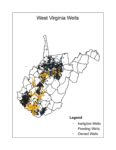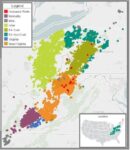Information on Filing a Complaint with the DEP Office of Oil & Gas
You can and should file a complaint with the DEP Office of Oil and Gas (OO&G) if a driller on your land, or anyone’s land, is not complying with the Soil Erosion and Sediment Field Manual, is allowing pit waste or chemicals to spill, or otherwise doing things that you think are probably not right.
Emergency spills and other pollution should be reported immediately by calling 1-800-642-3074.
You may also file complaints and report suspicious activity to the Environmental Protection Agency (EPA).
Filing complaints is important to correct the problem. Filing complaints is also important, because it gives elected officials who may actually want to do the “right thing” the backup they need to do so.
We have found that it is best to make complaints to the OO&G office in Charleston, as opposed to contacting the inspector directly. This is also what the agency prefers. Jason Harmon is the person in charge of handling complaints and contacting the inspector. The best thing to do is to take pictures of the problem and start keeping a diary of what you see and whom you talk to about it. It is best to take the pictures with a digital camera, if you have one, and e-mail your complaint along with the pictures to Henry.J.Harmon@wv.gov. You can also mail them in or fax your complaint to the number below. You can also call on the phone. Again, the person to contact at this time is Jason Harmon. He can be reached at (304) 926-0499 or (304) 926-0450 (OO&G main number). If Jason is unavailable, someone else can take the complaint through the main number.
Complaints may also be mailed or faxed to:
Office of Oil and Gas
601 57th Street, SE
Charleston, WV 25304-2345
FAX: (304) 926-0452
If possible, we recommend filing complaints electronically via and including digital photos. Please consider sending a copy of your complaint to us at info@wvsoro.org and to your legislators. (Click here to find out who your legislators are and how to contact them). Then follow up and let us know how the DEP responds. We may be able to help, and we want to collect information on complaints filed.
Again, emergency spills and other pollution should be reported immediately by calling 1-800-642-3074.
Below are some guidelines from the DEP on filing a complaint:
- Before you file an environmental complaint, it is important to understand that your name may be released by the agency. In order to remain anonymous, you must request your complaint to remain anonymous.
- Complaints received by phone are always accepted; however, it is recommended that you follow up the phone conversation with a written complaint. The written complaint starts a paper trail that is much easier for the agency to track and monitor.
- You also should document the names of the people you contact, the dates of phone conversations, and the topic of the conversation. If you made a written complaint, keep a copy of your letter, and the written responses you receive.
- When a complaint is called in, it is important that it be delivered to the appropriate field office. If you want to speak to the inspector personally, your call may need to be transferred to a field office. Be patient. It may seem as though you are being given the runaround, but we want to connect you to the correct office.
- The response time for an inspector to visit the site of the complaint may depend on the urgency of the complaint. The inspectors are assigned to specific areas of the state, and most inspectors serve several counties and many facilities.
- When filing a complaint, it is extremely helpful to the agency if you explain your problem in as much detail as possible. Include information like the time and date the problem occurred; the exact location to be investigated as well as directions to the site; a phone number so the inspector can call you; explicit details of the problem.
Information on Filing a Complaint with the EPA
In 2010, the U.S. Environmental Protection Agency (EPA) established the “Eyes on Drilling” tipline for citizens to report non-emergency suspicious activity related to oil and natural gas development. As of October 2012, the agency is asking citizens to report all shale gas and energy extraction tips and complaints via the national Report a Violation system’s tip intake form at http://www.epa.gov/tips/ rather than through “Eyes on Drilling”. Tips can still be submitted by phone by calling the EPA Region 3 Office at 1-800-438-2474 (toll free) if you observe what appears to be illegal disposal of wastes or other suspicious activity. You may provide tips anonymously. However, if you do not provide contact information, EPA may be unable to contact you for additional information that may be needed to determine whether or not an investigation is warranted. If you do provide contact information, this information may be used to initiate follow-up communications with you and may be shared by EPA with appropriate administrative, law enforcement, and judicial entities engaged in investigating or making judgments or rulings related to the tip or complaint.
In the event of an emergency, such as a spill or release of hazardous material, including oil, to the environment, citizens are advised to call the National Response Center at 1-800-424-8802.
Public concern and awareness about the environmental impacts of oil and natural gas drilling has increased, particularly regarding development of the Marcellus Shale formation where a significant amount of activity is occurring. While EPA doesn’t grant permits for oil and gas drilling operations, there are EPA regulations, which may apply to the storage of petroleum products and drilling fluids. The agency is also very concerned about the proper disposal of waste products, and protecting air and water resources.
EPA wants to get a better understanding of what people are experiencing and observing as a result of these drilling activities. The information collected may also be useful in investigating industry practices. The agency is also counting on concerned citizens to report unusual or suspicious activity related to drilling operations. EPA is asking citizens to report the location, time and date of such activity, as well as the materials, equipment and vehicles involved and any observable environmental impacts.
Instructions
Tipline number (toll free): 1-800-438-2474
Tip website: http://www.epa.gov/tips/
Tip mailing address: EPA Region 3
1650 Arch Street (3CEOO)
Philadelphia, PA 19103-2029
Documenting Suspicious Activity
To the extent possible, record:
• Location of the event
• Date of the event
• Time of the event
• Who, if anyone you interacted with during the event
Photos and videos are great ways to document observations. Be sure to record the date and time the photo or video was taken. If the alleged environmental violation has been recorded via video or photographs, be sure to include that fact in your description, when you file your complaint.
When describing what you observed, include:
• Activity taking place, including description of equipment and materials involved
• Descriptions of vehicles
– Color
– Company name or logo
– License plate number
– Type of vehicle
• Destination of discharge (physical location and stream name, if known)
• Environmental impacts: discoloration, dying vegetation, dead fish or other wildlife
Thank you for reporting this information to EPA.
(Note that the EPA often responds by contacting the State/DEP to investigate. If you are calling the EPA because you are unsatisfied with the State’s action this should be clearly communicated to the EPA.)










